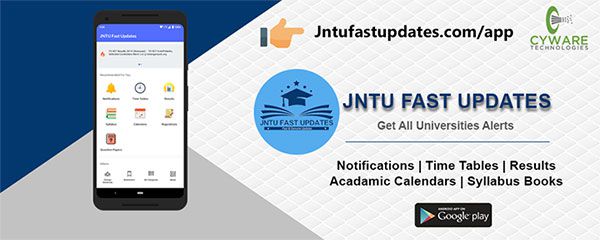JNTUK R16 3-1 Renewable Energy Sources Material PDF Download
Students those who are studying JNTUK R16 EEE Branch, Can Download Unit wise R16 3-1 Renewable Energy Sources Material/Notes PDFs below.

JNTUK R16 3-1 Renewable Energy Sources Material PDF Download
Preamble: This course gives a flavor of renewable sources and systems to the students. It introduces solar energy its radiation, collection, storage and its applications. This covers generation, design, efficiency and characteristics of various renewable energy sources including solar, wind, hydro, biomass, fuel cells and geothermal systems.
OBJECTIVES:
- To study the solar radiation data, extraterrestrial radiation, radiation on earth’s surface.
- To study solar thermal collections.
- To study solar photo voltaic systems.
- To study maximum power point techniques in solar pv and wind energy.
- To study wind energy conversion systems, Betz coefficient, tip speed ratio.
- To study basic principle and working of hydro, tidal, biomass, fuel cell and geothermal systems.
UNIT-1
Fundamentals of Energy Systems and Solar energy Energy conservation principle – Energy scenario (world and India) – various forms of renewable energy – Solar radiation: Outside earth’s atmosphere – Earth surface – Analysis of solar radiation data – Geometry – Radiation on tilted surfaces – Numerical problems.
Download UNIT-1 Material PDF | Reference-2
UNIT–2:
Solar Thermal Systems Liquid flat plate collectors: Performance analysis –Transmissivity– Absorptivity product collector efficiency factor – Collector heat removal factor – Numerical problems. Introduction to solar air heaters – Concentrating collectors, solar pond and solar still – solar thermal plants.
Download UNIT-2 Material PDF | Reference-2 | Ref-3
UNIT–3:
Solar Photovoltaic Systems Solar photovoltaic cell, module, array – construction – Efficiency of solar cells – Developing technologies – Cell I-V characteristics – Equivalent circuit of solar cell – Series resistance – Shunt resistance – Applications and systems – Balance of system components – System design: storage sizing – PV system sizing – Maximum power point techniques: Perturb and observe (P&O) technique – Hill climbing technique.
Download UNIT-3 Material PDF | Reference-2
UNIT–4:
Wind Energy Sources of wind energy – Wind patterns – Types of turbines –Horizontal axis and vertical axis machines – Kinetic energy of wind – Betz coefficient – Tip–speed ratio – Efficiency – Power output of wind turbine – Selection of generator(synchronous, induction) – Maximum power point tracking – wind farms – Power generation for utility grids.
Download UNIT-4 Material PDF | Reference-2
UNIT–5:
Hydro and Tidal power systems Basic working principle – Classification of hydro systems: Large, small, micro – measurement of head and flow – Energy equation – Types of turbines – Numerical problems. Tidal power – Basics – Kinetic energy equation – Turbines for tidal power – Numerical problems – Wave power – Basics – Kinetic energy equation – Wave power devices – Linear generators.
Download UNIT-5 Material PDF | Reference-2
UNIT–6:
Biomass, fuel cells and geothermal systems Biomass Energy: Fuel classification – Pyrolysis – Direct combustion of heat – Different digesters and sizing. Fuel cell: Classification of fuel for fuel cells – Fuel cell voltage– Efficiency – V-I characteristics. Geothermal: Classification – Dry rock and hot acquifer – Energy analysis – Geothermal based electric power generation
TEXT BOOKS:
- Solar Energy: Principles of Thermal Collection and Storage, S. P. Sukhatme and J. K. Nayak, TMH, New Delhi, 3rd Edition.
- Renewable Energy Resources, John Twidell and Tony Weir, Taylor and Francis – second edition,2013.
REFERENCE BOOKS:
- Energy Science: Principles, Technologies and Impacts, John Andrews and Nick Jelly, Oxford University Press.
- Renewable Energy- Edited by Godfrey Boyle-oxford university.press,3rd edition,2013.
- Handbook of renewable technology Ahmed and Zobaa, Ramesh C Bansal, World scientific, Singapore.
- Renewable Energy Technologies /Ramesh & Kumar /Narosa.
- Renewable energy technologies – A practical guide for beginners – Chetong Singh Solanki, PHI.
- Non conventional energy source –B.H.khan- TMH-2nd edition.
OUTCOMES:
- Analyze solar radiation data, extraterrestrial radiation, and radiation on earth’s surface.
- Design solar thermal collectors, solar thermal plants.
- Design solar photo voltaic systems.
- Develop maximum power point techniques in solar PV and wind energy systems.
- Explain wind energy conversion systems, wind generators, power generation.
- Explain basic principle and working of hydro, tidal, biomass, fuel cell and geothermal systems.


Syllabus pdf not matching